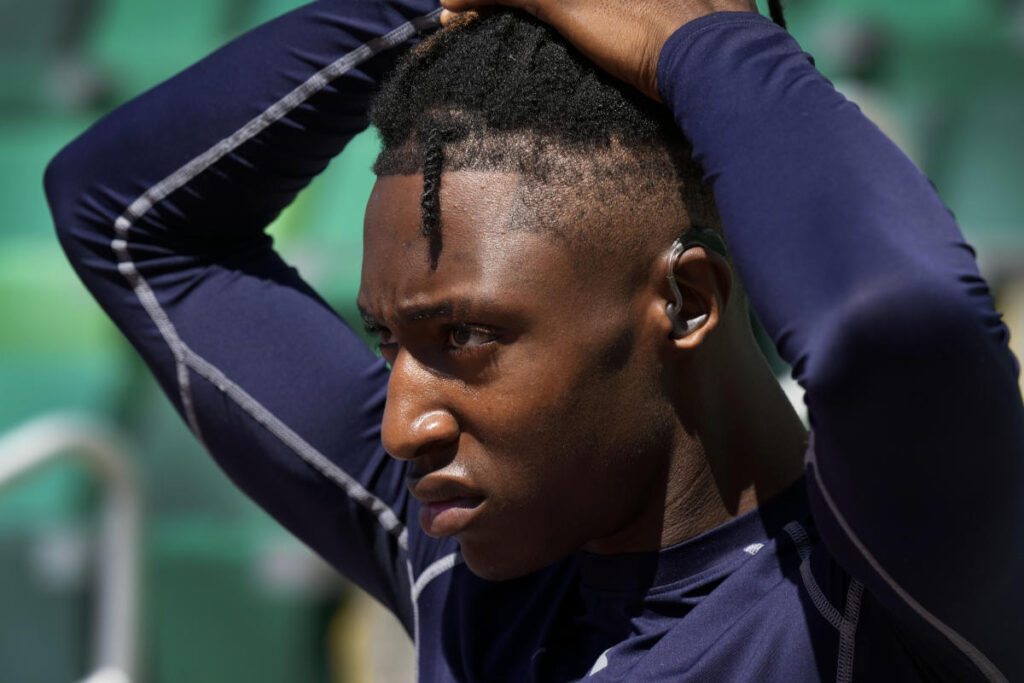EUGENE, Ore. (AP) — When Eric Gregory crouches down in the starting blocks, his coach is right next to him.
This is the best way for a 400-meter sprinter to ensure a fast start, because Gregory can barely hear the starter's commands and sometimes the sound of the starter's pistol.
Gregory lost much of his hearing as a child, so he waits for his coach, Byron Moore, to give the signal, usually from the right lane, and yell “Let's go!” after the pistol.
The system is working perfectly. Gregory just won his third straight Division III national title at Gallaudet University. He placed 35th out of 35 in the 400 meters at the first round of the U.S. Olympic Track and Field Trials on Friday. But doing well here is only part of his plan. He's eager to make a big impression.
“The only way people are going to look up to us or look at us and know who we are is if we put in the effort,” Gregory said in an interview conducted with the help of his coach and the school's associate athletic director and public relations officer, Sam Atkinson. “Just because you're deaf doesn't mean you can't do it. You have feet, you have hands, you can smell, you can taste, you can see. It doesn't matter. You have to do it.”
Gregory grew up in Louisiana and began losing his hearing around age 5. He said he doesn't know why, and it could have been due to an illness, or it could have been caused by a fall on his head while wrestling with his brother as a child.
He has 25 percent hearing in his right ear and 35 percent hearing in his left ear, and although he wears hearing aids he usually doesn't wear them while racing because the wind distorts any sound.
That's why he turned to Moore, his coach at Gallaudet University in Washington, D.C., a world leader in educating deaf students. Moore learned of Gregory from Tony Tatum, a former standout football player at Gallaudet who now scouts students and athletes. Tatum told Moore the high school kid might be worth keeping an eye on.
Gregory, who was already fast, continued to improve under Moore's guidance. Last month, he set a U.S. deaf collegiate record in the 400 meters (45.73) at the NCAA Division III National Championships in Myrtle Beach, South Carolina. That time earned Gregory a chance to win a lane at the trials.
“I looked at the list last week and it said 'passed,'” Moore said, adding that she was told she would receive a special certificate to compete. “My whole body started shaking.”
Gregory will compete in lane two on Friday in the second of five qualifying rounds. The final is Monday, with the top three competitors selected for the U.S. Olympic Team for Paris.
“We all want to see success this weekend,” Moore said. “Not just the publicity or the pardon approval, but the fact that he can come here and do well, that's the goal.”
Coach and sprinter stay in step on the track. At the command “go,” Moore raises his hands and waits for the coach to step into the blocks. The coach lowers his hands to eye level. At the command “go,” Moore pulls his hands back. Gregory steps out of the blocks, waiting for the gun to go, and Moore encourages the coach by yelling, “Let's go!” The only problem is that the starting pistol is replaced by an electronic starting sound, which Gregory has trouble hearing.
The pair have been told they will be able to use the starter's pistol for their own heats at the trials, and if they aren't, Moore will assist, as he has stomped hard on the track at the starts for some of his riders.
The only time a start was truly tough was during a meet as a freshman when Gregory didn't take the required crouching position in the blocks because he didn't hear instructions.
“I had a little chat with our starting pitcher afterwards,” Moore said.
Gregory was adamant that he was not competing at a disadvantage in a sport where split seconds can make all the difference.
“If you can do it, you can do it,” Gregory said of running fast.
All he wants is a chance to compete against the likes of Lane and 400m champion Michael Norman at the 2022 world championships at Hayward Field.
“I'm competing against the big dogs,” said Gregory, who hopes to follow in Moore's footsteps and become a coach one day. “I'm competing against people that are going to put me in a position to grow and learn and get better.”
Gregory is constantly studying video and races, sending Moore footage at any time of the night.
“He's worked hard to get here,” Moore said. “He deserves to be here with these great athletes, and he's ready to show the world what he can do.”
___ AP Summer Olympics: https://apnews.com/hub/2024-paris-olympic-games

